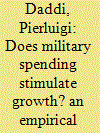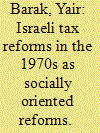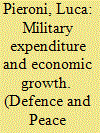| Srl | Item |
| 1 |
ID:
160213


|
|
|
|
|
| Summary/Abstract |
This paper investigates the effect of military burden on economic growth and extends previous works on the optimal size of government expenditure by exploring how external threat affects the preferences of the households and, in turn, economic growth. Post World War II Italian data are used to estimate nonlinear growth models using time-series semi-parametric methods. The estimates show that total government and civilian burdens are productive, whereas, military burden has significant effects on economic growth through the expenditure for peacekeeping missions, which reduces the insecurity in the home country. This may justify economically the current not negligible budget devoted to peacekeeping and humanitarian missions.
|
|
|
|
|
|
|
|
|
|
|
|
|
|
|
|
| 2 |
ID:
170704


|
|
|
|
|
| Summary/Abstract |
The income tax reform in Israel that was introduced in August 1975 bridged two ostensible objectives: the enlargement of levying and the provision of a redistributive mechanism. In other words, it aimed to establish a system that would simultaneously achieve economic efficiency and social justice. The reform was unique since it invented an original Credit Points mechanism that linked together efficiency and distributive justice.
Introducing the Value Added Tax a year later was also justified as an indirect progressive tax that could be related to as a business tax rather than as an expenditure tax, levied directly on customers. One of the main concerns of the leading academic economists during that period was the enlarged socio-economic gap. Hence, the two tax reforms were also justified by pro-social arguments.
|
|
|
Key Words
|
Economists
;
Direct taxation
;
Military Burden
;
VAT
;
Tax Burden
;
Credit points, direct tax reform, economists, family grants, inequality, Israbluff, military burden, tax burden, social gap, VAT,
|
|
|
|
|
|
|
|
|
|
|
|
|
|
| 3 |
ID:
090392


|
|
|
|
|
| Publication |
2009.
|
| Summary/Abstract |
This paper tests the relationship between military expenditure and economic growth by including the impact of the share of military and civilian components of government expenditure in an economic growth model with endogenous technology. In this framework, we empirically consider the hypothesis of a non-linear effect of military expenditure on economic growth. Differences between the costs and benefits of the defence sector has traditionally explained the non-linear relationship suggesting that shocks to insecurity may also be a source of non-linearity as they determine a re-allocative effect within government expenditure. While parametric partial correlations are in line with empirical findings, the robustness of estimations is tested by using a non-parametric approach. The negative relationship between military expenditure and growth in countries with high levels of military burden predicted by theory becomes significant only after including a proxy for re-allocative effects in the growth equation.
|
|
|
|
|
|
|
|
|
|
|
|
|
|
|
|